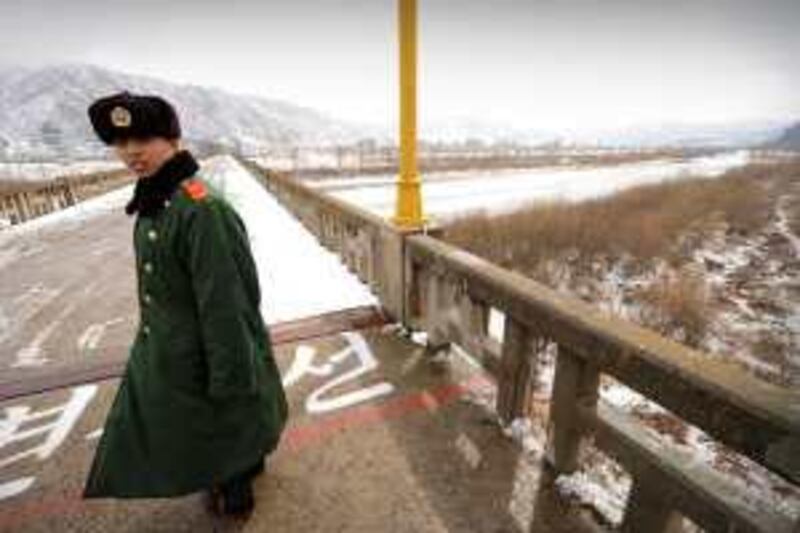BEIJING // The case of two US journalists detained in North Korea is likely to add to tensions between the communist state and the US, already high after the North's recent announcement it will launch a rocket next month.
After days of silence, North Korea over the weekend confirmed it had detained the journalists, both women, on charges of "illegally intruding" into the country, without giving their names. A male cameraman and Chinese guide reportedly escaped. It remains unclear what happened near the Tumen River on the border between China and North Korea where the women, identified as Laura Ling and Euna Lee, reporters for Current TV, an online media outlet owned by Al Gore, the former US vice president, were arrested by a North Korean border patrol.
According to the Rev Chun Ki-won, a South Korean pastor with the Seoul-based Durihana Mission, a Christian group that helps defectors, who assisted in organising the journalists' trip, Current TV had planned to document the plight of North Korean refugees. Mr Chun warned against it, but the outlet said it would send reporters of Asian descent so that they would not stand out. Ms Ling is Chinese-American and Ms Lee is Korean-American.
"When they first approached me with the plan, I told them not to go there. It's too dangerous. A western person in that area is very conspicuous. But they insisted that they would send Asian-looking journalists," Mr Chun said during a telephone interview from New York. North Korea's far northern border is porous and vaguely demarcated and is often used by North Koreans fleeing their country. In March, many parts of the river are frozen. Mr Chun suspects the two women's journalistic ambition spurred them on to brave the conditions and cross into North Korea.
"I reminded them to consult me before making any new move, but?" he said, before trailing off. South Korean media reports said the women are likely to have been taken to Pyongyang for questioning. "Considering the significance of the case, there is a high possibility that the two US journalists have been sent to Pyongyang and are undergoing a direct investigation" by the North's spy agency and military, South Korea's Yonhap news agency quoted a source in China it described as privy to North Korean affairs.
Some believe North Korea intends to drag the case out and politicise it. "They will say that they need to investigate these two Americans. Pyongyang will enact a play in order to make Washington anxious," said an analyst in Seoul who did not wanted to be named because he advises the government. The incident has come at a sensitive time as US and international pressure on North Korea mounts following its announcement it plans to launch a long-range rocket next month. The US state department has said the secretary of state Hillary Clinton is paying close attention to the case.
A US official said on Saturday that the US has been in touch with North Korean representatives about the journalists and is awaiting a reply, the Associated Press reported. Analysts say Pyongyang may well use the detentions as a bargaining chip against the US in talks over the missile launch and Pyongyang's nuclear situation, though most predicted the women would be released in the near future. "Whether they apply a spy charge on the Americans or not, they won't hold them for long. It's still the initial period of the new Obama administration and Pyongyang actually is likely to use the case as a favour to give to Washington in an attempt to hold an early bilateral meeting," said Kim Yong-hyun, a North Korea studies professor at Seoul's Dongguk University.
Peter Beck, an international crisis expert at the American University in Washington DC who has been to the China-North Korea border area where the women were arrested, agreed. "It's a relatively minor incident. The release is a matter of time," he said, adding that the arrests were not in North Korea's interests. "Pyongyang actually doesn't want this at this time. I don't think North Korea has much to gain with these two individuals, practically."
Mr Beck said the report about the alleged transportation of the journalists to the capital Pyongyang, is probably an intermediate move to release the two to South Korea through the Panmunjom village inside the Demilitarised Zone that has divided the peninsula since the 1950-53 Korean War. With the fallout of the incident, meanwhile, Mr Chun is worried that underground Christian groups working along the border to help North Korean refugees will be affected. "I am quite worried about it," he said. "But that won't stop our work."
Mr Beck said the matter depends on how the Chinese authorities react. "They can use the situation as an opportunity to crack down on refugees. But then, conditions for the refugees were already harsh, so it won't discourage them from coming either." Another US citizen, Evan Hunziker, was detained in North Korea in 1996 after he swam cross the Yalu River along the China-North Korean border while drunk. On that occasion it took five weeks for Pyongyang to confirm he had been detained before he was released after three months.
"This time, I think the release will be sooner, rather than later," Mr Beck said. "But then, you never know. You're dealing with North Koreans." slee@thenational.ae





